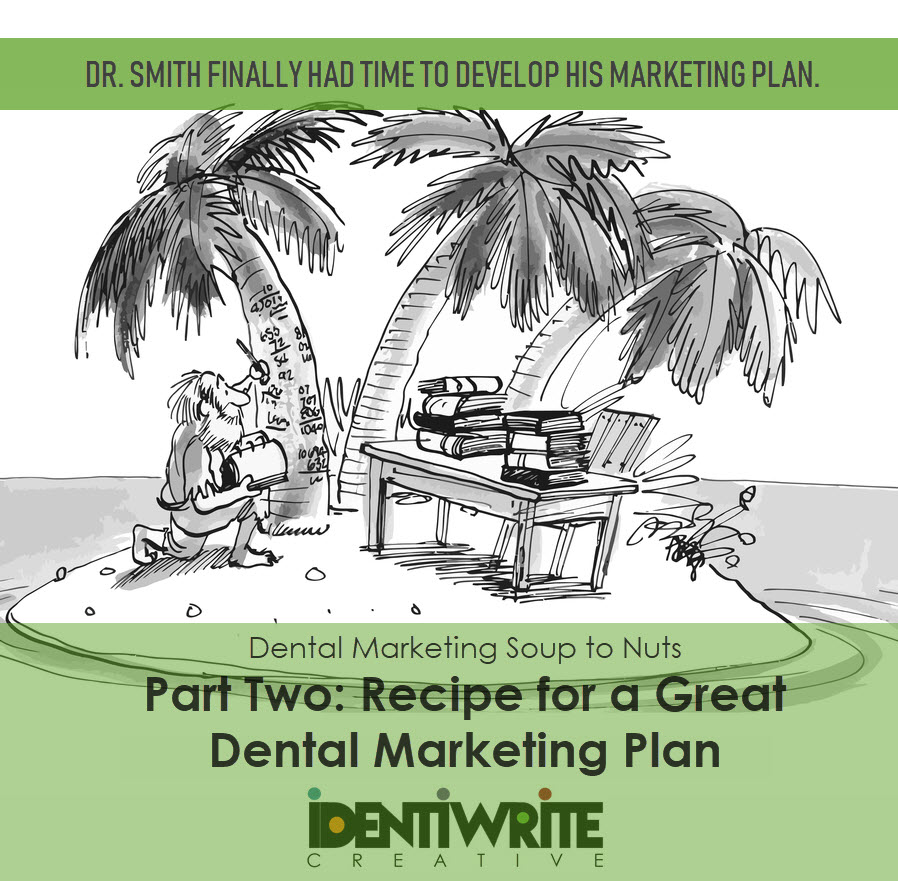“It’s all in here,” he said, as he tapped his index finger to his temple. “I never write things down, but I have a mind like a steel trap, and I know what I’m doing.”
What was this dentist asked? Do you have a marketing plan for your dental office? His answer is typical. Here’s another one I hear quite often:
“That’s why I hired you,” she said, with a knowing grin. “You work it all out. I don’t have time for the nuts and bolts of it. I trust you.”
I appreciate the trust, but I don’t read minds. Writing down a business plan is imperative to success. Forbes conducted a study of Harvard graduate students, regarding goal setting and its relation to earnings. Just 3% of the students wrote down their goals; 18% had goals but never wrote them; a whopping 84% did not have hard, fast goals set. These are smart people, and they didn’t set goals. How’d that turn out?
The 3% who wrote down their goals were earning ten times as much as the others, ten years later.
Why do you need a written business plan?
- To stay on track – We all get bogged down in the mire of daily duties, whether we’re planning treatment or filing taxes. Staying excited and on track with your initial business plan is more achievable if you can pick up a diary of your ideas (your business plan) and reignite the energy at any time.
- To check progress – If you’re married, you know that a lot happens in the first two years of wedded bliss. Your vision for the marriage on your wedding day and what actually happened, looking back on your second anniversary, probably do not exactly match, because life happened along the way. A dental practice business plan can provide landmarks that allow you to check progress, much like personal goal setting will. Plans and goals give you destinations to shoot for, day by day. Personal goal: buy a home by year two of marriage. Professional goal: double hygiene staff in year two of business.
- To organize thoughts, goals, and plans
- For value – in case you ever want to pursue investors, partnership, or selling the practice

How to Build a Business Plan
The best template I know of for guiding a business plan is a free resource provided by the Small Business Administration in the USA. I strongly suggest you take time to review it and complete it.
Now, I want to talk about the marketing part of your business plan. A comprehensive marketing plan can take quite some time to create. It will include numbers and projections, and a lot of other data. Let’s focus on the target market avatar, competitors, and budget planning.
Today, we’ll discuss the avatar.
Target market (avatar):
We used to all it the target market. The younger generation says “avatar,” referring to the ideal client, or patient. One of the most important things you can do to understand how to market your dental office is to first understand what your favorite patient looks like.
Answer these questions; do not skip any. I know that you’ll treat anyone, but that is not what I’m asking. We must identify your best, ideal, perfect patient.
- What age is your ideal patient?

- What is his/her profession?
- How much money does he/she make each year?
- Where does this patient live?
- Work?
- How does he/she feel about oral health and overall health?
- Does the patient use dental insurance?
- What procedures does he/she need you to provide?
- Does he/she have children? Will you treat them as well?
- How does this patient find new services? (Online, word of mouth referral, in the newspaper, drive by, spouse chooses, etc?)
Now, consider your dental office.
- How many of these ideal patients live within a 12-mile radius of your practice?
- How many dentists who could serve this patient are also within 12 miles of your office?
- Is your current marketing and advertising in front of this avatar? How often?
- Is your dental staff well suited to cater to your ideal patient?
- Is your office equipped to cater to your ideal patient?
- Are your own skills adequate to fulfill the needs of your ideal patient?
Next, put yourself in this avatar’s shoes. Be your own secret shopper. Imagine what your avatar’s average day has entailed, and that you have lived such a day. You are scheduled as a new patient for the last appointment on a Tuesday, in your office.
- What do you see, hear, smell, feel, and think when you enter the dental office’s parking area?
- When you approach the entry door?

- When you enter?
- When you are greeted?
- While you are waiting?
- When you are escorted to the treatment room?
- While you’re alone in the operatory?
- When the assistant takes x-rays?
- When the hygienist cleans your teeth?
- When you ask questions?
- When you see and experience the technology of the office?
- When the dentist performs an exam?
- When your treatment plan is explained?
- When payment information is explained?
- When you check out?
- When you get back in your car?
- If you were to post about your experience on Facebook right now, what would you write?
The answers you want your ideal patient to have must be worked for – they will not come naturally. You must create the experience by training, investing, and building many facets of your practice. These include how the facility looks, smells, feels, and impresses, and how your team looks, smells, feels, and impresses. Even when they’re having an off day.
To sum up the take away here,
To attract your avatar, you must purposefully create the experience that will impress that avatar and keep him coming back and telling his or her peers about your office.
For marketing,
You must promote the message that will attract your avatar, in the places your avatar will repeatedly see it. A call to action must be simple and enticing.
This includes ONLINE marketing and IN PERSON marketing and OFFLINE marketing. So, for each of the bulleted items below, make notes about how you can appeal to your avatar. Be specific. Take time. Brainstorm with your top team members or associates.

Online marketing:
- Website
- Testimonials
- Social media
- Blogs
- Citations and listings
- Ads
- Articles on third party sites
- Videos
- Images
In person marketing:
- Team interaction with patients
- Posters and signs
- Brochures
- TVs
- Give aways/contests/appreciation
- Asking for referrals
Offline marketing:
- All print marketing
- All radio and television marketing
- All mail marketing
- Word of mouth
- Community involvement
- Billboards/signs
- Sponsorships
- Business partnership programs
Help with Dental Office Marketing
If you need a dental marketing consultant to walk through these things with you, or to help you with your website, content marketing, and other aspects of practice promotion, call Identiwrite Creative today. I’m Shauna Duty, the owner and managing director at Identiwrite Creative, and I’ve been in the dental marketing arena for over 15 years. I’ll be happy to talk with you about your practice’s vision and goals, so we can establish a solid marketing plan for growth and profit. Call me now at 940-395-5115 or email [email protected].



